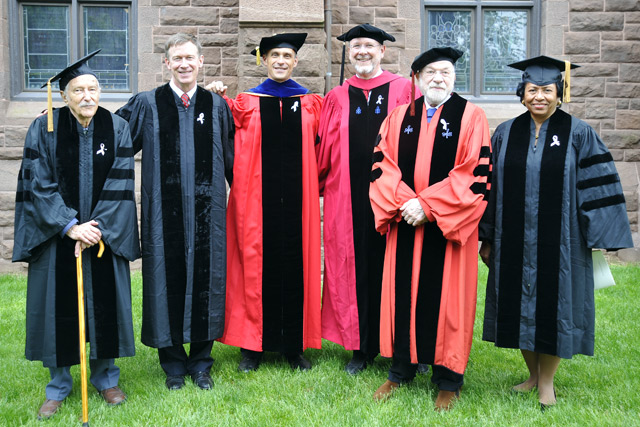Hickenlooper, Simmons, Cavell, Winslow Receive Honorary Degrees

John W. Hickenlooper ’74, MA ’80; Ruth J. Simmons; Stanley Cavell; and Richard Winslow ’40 received Honorary Degrees at the 2010 Commencement Ceremony May 23.
John W. Hickenlooper received a Doctor of Laws, presented by Rob Rosenthal, the John E. Andrus Professor of Sociology. A geologist turned entrepreneur who had never run for political office (not even student council), Hickenlooper was elected mayor of Denver in 2003 and re-elected in 2007. In April 2005—less than two years into his first term—Time Magazine named the political newcomer one of the top five “big-city” mayors in America. Mayor Hickenlooper brings creative leadership and innovative thinking to Denver’s city hall, drawing on his diverse background as an exploration geologist, real estate developer, and restaurateur.
Even before his political career, he was known for his civic engagement, having been involved with diverse downtown Denver renovation and development projects, especially in Denver’s Lower Downtown historic district. In recognition of these efforts, the National Trust for Historic Preservation gave him a National Preservation Award in 1997. He also led a grassroots campaign in 2000 to preserve the “Mile High Stadium” name, an effort that planted the seed for his mayoral bid.
Since taking office, Mayor Hickenlooper has increased civic engagement and participation throughout the city and the Denver metro region, building strong bonds and partnerships that transcend partisan and geographic lines.
Stanley Cavell received a Doctor of Letters, presented by Sanford Shieh, associate professor of philosophy. Cavell received his A.B. in music from the University of California, Berkeley, and his Ph.D. in philosophy from Harvard University. From 1953 to 1956, he was a Junior Fellow in Harvard’s Society of Fellows. After teaching at Berkeley for six years, he returned to Harvard in 1963, where he was named the Walter M. Cabot Professor of Aesthetics and the General Theory of Value, a position he held until 1997, when he became professor emeritus.
His major interests center on the intersection of the analytical tradition (especially the work of Austin and Wittgenstein), with moments of the Continental tradition (for example, Heidegger and Nietzsche); with American philosophy (especially Emerson and Thoreau); with the arts (for example, Shakespeare, film and opera); and with psychoanalysis.
He has published 18 books, including Must We Mean What We Say?(1969); The World Viewed: Reflections on the Ontology of Film (1971); The Senses of Walden (1972); The Claim of Reason (1979); Pursuits of Happiness: The Hollywood Comedy of Remarriage (1981); Disowning Knowledge: In Seven Plays of Shakespeare (1987); Philosophical Passages: Wittgenstein, Emerson, Austin, Derrida (1995); Cities of Words (2004); and his memoir, Little Did I Know, which will appear this fall. Professor Cavell is a past president of the American Philosophical Association and was awarded a MacArthur Fellowship in 1992. Other honors include a fellowship that brought him to Wesleyan’s Center for the Humanities in 1970–71; the Morton Dauwen Zabel Award in Criticism from the American Academy and Institute of Arts and Letters; the Centennial Medal from Harvard University’s Graduate School; and the Romanell Phi Beta Kappa Professorship, awarded annually to distinguished scholars in the field of philosophy.
Ruth J. Simmons received a Doctor of Letters, presented by Shonni J. Silverberg ’76, M.D., Professor of Medicine, Columbia University College of Physicians and Surgeons. Simmons was sworn in as the 18th president of Brown University on July 3, 2001. During her tenure, she has created an ambitious set of initiatives designed to expand and strengthen the faculty; increase financial support and resources for undergraduate, graduate and medical students; improve facilities; renew a broad commitment to shared governance; and ensure that diversity informs every dimension of the university.
A French professor before entering university administration, President Simmons also holds an appointment as a professor of comparative literature and of Africana studies at Brown. She graduated from Dillard University in New Orleans and completed her Ph.D. in Romance languages and literatures at Harvard. She served in various administrative roles at the University of Southern California, Princeton University, and Spelman College before becoming president of Smith College, the largest women’s college in the United States. At Smith, she launched a number of initiatives including an engineering program, the first at an American women’s college.
President Simmons is the recipient of many honors, including a Fulbright Fellowship, the 2001 President’s Award from the United Negro College Fund, the 2002 Fulbright Lifetime Achievement Medal, and the 2004 Eleanor Roosevelt Val-Kill Medal. She is a frequent speaker at major international forums, including the National Press Club, the White House, and the World Economic Forum. She is a member of the Howard University board of trustees.
Richard K. Winslow ’40 received a Doctor of Letters, presented by Mark Slobin, Professor of Music. Winslow is a beloved professor emeritus of the music department. Called a “true original” by colleagues, he is a prolific composer who also had the vision to imagine Wesleyan’s World Music Program and the organizational skills to establish it.
While earning his B.A. in English at Wesleyan, he also showed a strong interest in music. After working in concert management in New York City, he served in the U.S. Navy and then attended Julliard. He returned to Wesleyan to teach and was a member of the Music Department from 1949 to 1983; he was the John Spencer Camp Professor of Music and department chair from 1957 to 1979.
Professor Winslow was crucial in the expansion of Wesleyan’s musical horizons to include non-Western music, avant-garde music, and jazz. Twice he brought distinguished composer John Cage to Wesleyan as a fellow in Wesleyan’s Center for Advanced Studies, and he was key to the founding of Wesleyan’s Ethnomusicology Graduate Program.
His compositions—referred to by fellow faculty members as “seductive”—range widely from functional music for the Wesleyan Glee Club (which he conducted) to large-scale operas and oratorios to works for plays by Gertrude Stein and Samuel Beckett. Professor Winslow received a Guggenheim Fellowship in composition in 1956 and Wesleyan’s Distinguished Alumnus Award in 1970.

